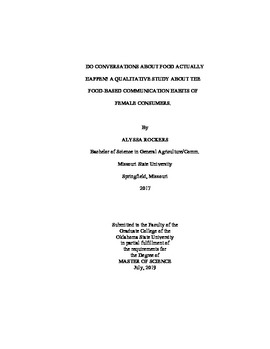| dc.contributor.advisor | Settle, Quisto | |
| dc.contributor.author | Rockers, Alyssa | |
| dc.date.accessioned | 2020-01-30T19:46:51Z | |
| dc.date.available | 2020-01-30T19:46:51Z | |
| dc.date.issued | 2019-07 | |
| dc.identifier.uri | https://hdl.handle.net/11244/323422 | |
| dc.description.abstract | Agricultural organizations have encouraged farmers and others involved in the agricultural industry to discuss their experiences with consumers and to have meaningful conversations about food. While agriculturalists are encouraged to share their stories on the internet through social networking platforms and blogs, they are also encouraged to have interpersonal conversations about food and agriculture. Due to the elevated concerns of mothers about food, and the nature of women and social capital, mothers are a forced to communicate about food and agriculture. | |
| dc.description.abstract | This qualitative study utilized in-depth interviews with mothers with agricultural backgrounds to answer four research questions: (1) What information are mothers sharing and receiving about food? (2) How does information they receive affect mothers' food purchasing decisions? (3) How do mothers characterize their relationships with those that they are having conversations about food and their connections with those individuals? (4) How are mothers are utilizing emotion and personal relationships to share information with others about agriculture and food? | |
| dc.description.abstract | Using constant comparative method, participants' responses were organized into themes. The themes that emerged were information sharing is often limited to certain scenarios, information receiving is mainly online, concerns about food are common, strangers are easiest to talk to about food and agriculture issues, and social pressures exist but are not felt by all. | |
| dc.description.abstract | While some mothers were willing to discuss food and agricultural issues with others, many participants were hesitant to discuss them to avoid tensions with acquaintances and those they were close to. As a result of their hesitance, mothers are not having the conversations encouraged by agricultural organizations. Some mothers feel judgment from their peers in the form of social pressure while grocery shopping which means relationships influence on food purchasing. This study provided insight into the standpoint of mothers with agricultural backgrounds. Agricultural communications practitioners should use this information to give women the tools to have conversations about food and agriculture without fear of causing tension. Agricultural communications educators should use the results of this study to provide students with an idea of how mothers will communicate with each other about agricultural and food issues. | |
| dc.format | application/pdf | |
| dc.language | en_US | |
| dc.rights | Copyright is held by the author who has granted the Oklahoma State University Library the non-exclusive right to share this material in its institutional repository. Contact Digital Library Services at lib-dls@okstate.edu or 405-744-9161 for the permission policy on the use, reproduction or distribution of this material. | |
| dc.title | Do Conversations About Food Actually Happen? A Qualitative Study About the Food-Based Communication Habits of Female Consumers | |
| dc.contributor.committeeMember | Cartmell, Dwayne | |
| dc.contributor.committeeMember | Riggs, Angel | |
| osu.filename | Rockers_okstate_0664M_16370.pdf | |
| osu.accesstype | Open Access | |
| dc.type.genre | Thesis | |
| dc.type.material | Text | |
| dc.subject.keywords | agriculture | |
| dc.subject.keywords | communications | |
| dc.subject.keywords | mothers | |
| dc.subject.keywords | qualitative | |
| dc.subject.keywords | women | |
| thesis.degree.discipline | Agricultural Communications | |
| thesis.degree.grantor | Oklahoma State University | |
